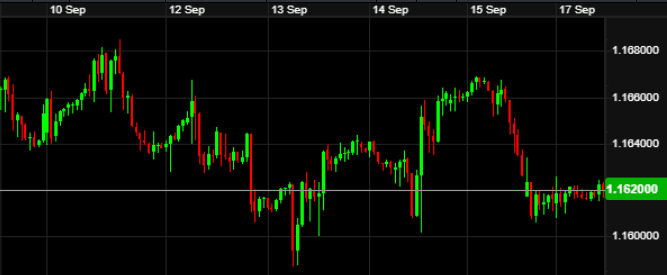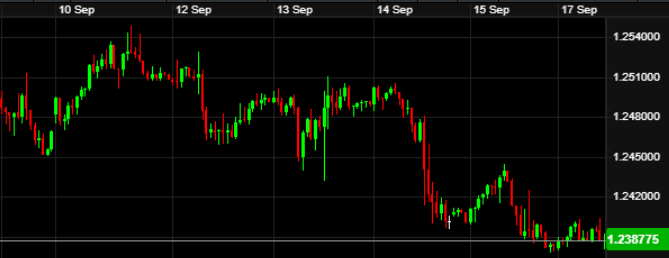ACM Update 18-09-23

Christine Lagarde and her fellow ECB members took Eurozone interest rates higher than ever before last week. But ten interest rate hikes in a row were not enough to stem a ninth consecutive week of losses for the Euro against the Dollar.
Elsewhere, UK unemployment increased, but wage growth has finally caught up with inflation for the first time in nearly two years. All eyes on the Federal Reserve and Bank of England this week.
A week earlier than their American and British counterparts, the ECB took most of the headlines on Thursday. Christine Lagarde and her fellow Frankfurt policymakers, faced a decision on a knife-edge as to whether to hike or pause. A Bloomberg survey of economists earlier in the week, saw 34 expecting a hold and 32 foreseeing a hike. It was the latter though which transpired, with Eurozone interest rates now sat at their highest level since the inception of the single currency.
The statement and subsequent press conference made it clear though that the ECB see this as the peak. “Rates have reached levels substantial enough to bring inflation back under control. Policy is to remain at sufficiently restrictive levels for as long as necessary”, commented President Lagarde.
Whilst good news that the bank think they have done enough to quash inflation, it wasn’t a positive note for the Euro itself. A lack of further rate hikes leads to a less than appealing picture for the currency, leading to further sell-offs. The ECB also saw the need to lower their growth forecast for 2023 down to 0.7%, as well as 2024 and 2025 being revised down. Lagarde stressed that lower growth does not mean recession though. That said, merely having to mention the R word doesn’t paint a great picture.
The latest interest hike will definitely not be of benefit to the already struggling German economy. Speaking of which, the other main Eurozone release last week was the German ZEW economic sentiment figure. This essentially is a mark of confidence levels amongst analysts and investors. The figure wasn’t as bad as forecast, however remains well into the “pessimistic” side of the scale, for what is now the fifth month in a row.
As already eluded to, we are now nine weeks in a row of losses for the Euro versus the Dollar. Given the weakness of the Euro it would be tough to bet against that becoming ten this week. Anyone selling Euros and buying Dollars may want to move sooner rather than later as a result.
The Euro has been somewhat stable against the pound though, perhaps not a glowing review of how the market feels about sterling currently, given the Eurozone’s troubles. Recent GBP-EUR moves can be seen in the chart below:

On the UK front, we had a number of different releases last week as we run up to this Thursday’s Bank of England meeting. Catherine Mann, one of the Bank’s nine policy-makers confirmed in a speech on Monday that she would be continuing to vote for rate hikes, preferring to “err on the side of over-tightening” policy, believing that holding interest rates where they are “risks enabling further inflation persistence”. Admittedly, this isn’t a change in her rhetoric.
Mann’s stance seems to be opposing comments from Governor Bailey the week before, where he thought the bank was “much nearer” to ending its run of rate increases. A very much split decision could be coming our way on Thursday.
Elsewhere, unemployment got a fraction worse for the last few months, not painting the rosiest of pictures for the jobs market. Unemployment is now its highest in almost two years, with the shift apparently caused by males and those out of work for six months plus.
However on a better note, for the first time in almost two years, wage growth has now caught up with inflation. Pay rose by 7.8% in the quarter to July versus the same period in 2022, now ahead of inflation and meaning that “real pay” is no longer falling. So a mixed bag of data on Tuesday morning.
On the other side of the coin though, GDP figures for July showed the economy shrank more than forecast. This was attributed to strike action across the NHS and teaching sectors, as well as the trusty British weather in July being, pretty awful! GDP dropped by -0.5% June to July, wiping out the 0.5% gain between May and June.
The economy seems to be yo-yoing back and forth at present, with sporadic spikes likely keeping the UK out of recession. All of this uncertainty as to the position of the economy, could well mean a rate hike is more likely from the Bank of England this week. This, if nothing else is holding GBP stable against the Euro currently at least.
So to the US, where the might of the Dollar continues against the Euro, but also hit its strongest position against the Pound for just over three months. Rates closed for the week circa 1.24.
Stateside, inflation bounced back up to 3.7% in August (3.6% forecast), from 3.2% the month before. This was largely put down to an increase in gas/fuel prices in the US more than anything else, but does open the door ever so slightly for an interest rate hike come Wednesday evening.
It might be the only factor pointing that way though. Other Dollar-based data last week continued to perform very favourably, pointing towards the much hoped-for soft landing. Retail sales showed a further 0.6% gain, now the fourth consecutive positive month for the figure. Weekly unemployment claims were also lower than expected.
For now we expect the Federal Reserve to signal a hold in interest rates on Wednesday, but to suggest they aren’t necessarily done overall with rate hikes. Watch for carefully selected words and a clear message from Jerome Powell.
Please see below the continued GBP-USD trend lower:

This week:
Monday – Rightmove UK HPI (00:01 UK time)
Tuesday – Reserve Bank of Australia Minutes (02:30), Eurozone Final CPI (10:00), Canada CPI (13:30)
Wednesday – UK CPI (07:00), Federal Reserve Rate Announcement (19:00) & Press Conference (19:30)
Thursday – Swiss National Bank Rate Announcement (08:30), Bank of England Rate Announcement (12:00), US Weekly Unemployment Claims (13:30)
Friday – Bank of Japan Rate Announcement (05:00), UK Retail Sales (07:00), UK/EU/US Manufacturing & Services PMI Data (08:15 to 14:45)
A big week ahead full of major central bank meetings, with the Federal Reserve, Swiss National Bank, Bank of England and Bank of Japan in that order.
Before that, UK inflation will be a very important figure. The measurement is expected to bounce back slightly from 6.8% to 7.1% this month, largely attributed to a rise in fuel costs as with the US. Andrew Bailey and Co, we expect to raise UK interest rates by another 0.25% on Thursday but expect a split decision. As a result, any GBP upside is expected to be short-lived and limited.
For the Federal Reserve, we can expect a hold in rates with some degree of confidence. Powell’s language in the following press conference will be the one to watch.
Again, a great time for any clients looking to sell USD (or any other currencies pegged to the Dollar, AED/QAR/SAR/HKD), especially into GBP or Euro. Great opportunities on both there so do reach out to the team if you are in this position.
Even if we do get a hike from the Bank of England, upside for the pound may not be worth holding out for given the might of the Dollar. A busy few days ahead!
Have a great week.